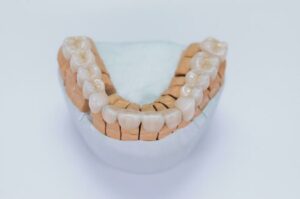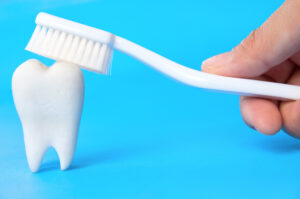If you have a heavily decayed tooth, or damaged tooth, your dentist’s office may recommend a dental crown procedure. A dental crown is also common after a root canal treatment. The good news is that your newly crowned tooth will be stronger, and you’ll be able to use it normally, like your natural teeth.
Table of Contents
ToggleWhat Are Dental Crowns?
A dental crown is a cap or covering to help protect and strengthen a damaged or broken tooth, giving support to the tooth structure, as well as for holding bridges and for cosmetic purposes.
When Is A Crown Useful?
Dental crowns cover and protect broken or decayed teeth when there is not enough of an original tooth to provide natural strength, or they can be used to protect a weaker tooth from breaking.
If you have had a very large filling, where the tooth decay involves a large percentage of your natural tooth, or it is severely worn, or you had root canal therapy, dental crowns are often used. They may also be used to help a tooth damaged by trauma, if it is chipped or cracked.
A dental crown also provides a strong base for holding bridges and dentures in place. One of your natural teeth is capped, which the bridge or denture will fix on to. They are also used to replace a missing tooth in the case of a dental implant.
For cosmetic purposes, a dental crown can cover a badly stained or dark tooth, or an uneven one, since they fully cover the visible portion of your tooth that shows past the gum line.

Dental Crown Procedure
A local anesthetic will be applied, for comfort. If you have a decayed tooth, it will be cleaned and treated first to ensure its health.
Next, the weak tooth is prepared by removing a tiny amount of its outer surface, so the crown can fit on top. The dental crown will be as thick as the layer that was removed.
The dentist will take a mould of the prepared tooth, and send it off for the crown to be custom-made. For aesthetics, it can be matched in colour to your natural teeth, using a shade guide. This will depend on the material being used for the dental crown. Metal crowns, such as gold crowns are not able to be matched.
A temporary crown is attached, to protect the prepared tooth until your custom crown is ready.
Temporary Crown
Because the mould of your tooth needs to be sent away to a dental laboratory, you will not be able to have a permanent crown applied in a same-day procedure.
A temporary crown is made from an impression of your tooth and applied until you are able to have your permanent crown affixed. A temporary crown is not as hard or functional as a permanent one, so it is critical to come back for the permanent one when it is ready. Temporary crowns may also not have the exact colour and look of your permanent one.
The temporary crown is important to protect the tooth, and prevent any shifting of the tooth so that your custom crown will still fit. You will need to be a little more gentle with it, and avoid tooth brushing and flossing.
Permanent Crown
When the custom crown is finished, at another appointment, your dentist will attach this final crown with dental cement or adhesive. You may have sensitive teeth for a couple of days, but this will ease.
Concerns To Contact Your Dentist About
If you have a chipped crown, it may be able to be repaired, if it’s just a small chip. Dental crowns with larger chips or several chips may need to be replaced.
If your crown feels loose, it may be because the cement that attaches it is being washed or worn away. This can allow bacteria to reach the tooth and can cause other issues. Your dentist will need to address any loose crowns.
If your dental crown falls off, it may be able to be reaffixed, but you will more than likely need to have it fully replaced.
Crown Materials
Dental crowns can be made from a variety of materials.
Metal Crowns
These crowns can be made of various materials, but gold is the most common. These last a long time and won’t chip or break. They also do not scrape or damage nearby teeth. However, these are the least aesthetically pleasing, so many prefer a different option, especially for front teeth.
Composite Crowns
These look very natural, and your tooth shade can be matched. These are highly resistant to chips. Brushing can wear away the polished surface and allow them to stain.
Ceramic Crowns and Porcelain Crowns
Ceramic and porcelain are the most natural looking of dental crowns, closely matching surrounding teeth, with porcelain being generally regarded as the most natural, because of its translucent appearance. One of these is often chosen for a front tooth. These are a little more likely to chip, but improvements are being made that make them stronger than ones attached several years ago.
There are also porcelain fused to metal crowns, which are sturdier but with the aesthetic appeal of porcelain. With porcelain fused to metal crowns, a tiny bit of metal may show along the gum.
With these crowns, the perfect shade for you will be matched.

Caring for Your Crowned Tooth
You can treat your crowned tooth the same as your other teeth; you should brush and floss as normal once it has been permanently crowned, and maintain other good oral hygiene habits. Avoid excessive grinding or chewing, such as chewing ice or using your teeth as a tool. Regular dentist visits are important to ensure your new crown stays in great shape.
Gateshead Dental Can Help
Gateshead Dental has experienced professionals who can help you get the smile you are looking for, with beautiful dental crowns. We ensure your overall oral health, for a healthier you, while paying attention to aesthetics, because a beautiful smile is important, too.
He’s completed a number of additional courses to best serve his patients and be able to educate them too. No matter your age or dental condition Dr. Sims can assist you in a professional manner and loves answering any of your questions or concerns.
- Is It Safe to Have Dental Work Done During Pregnancy? - February 28, 2024
- How Does A Dental Bridge Work? - January 17, 2024
- How Do Dental Implants Work? - January 16, 2024
